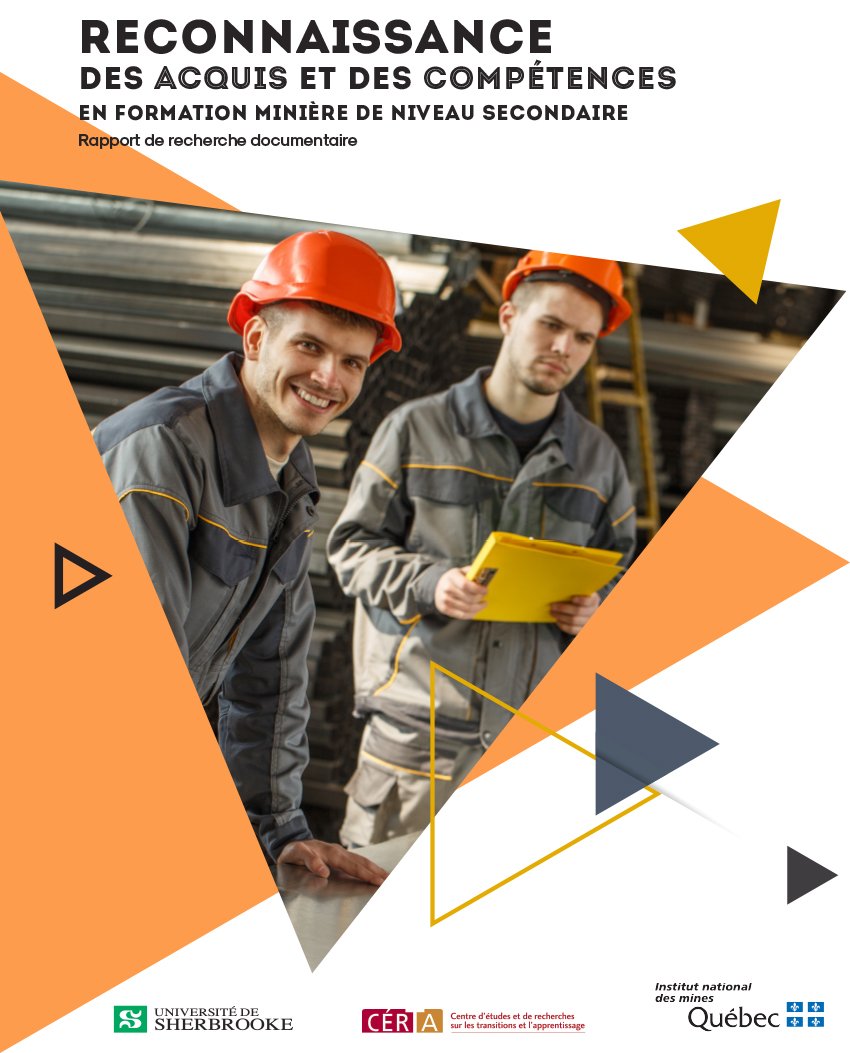Recognizing the Experience and Skills Needed to Obtain a Vocational Training Degree

On October 3, 2019, the Institut National des Mines du Québec (INMQ) launched its first report on Recognition of Acquired Competencies (RAC) in mining training leading to a professional studies diploma (DEC). The background report, “Reconnaissance des acquis et des compétences en formation minière de niveau secondaire”, the first research in the world to recognize the knowledge and skills in vocational training for the mining sector. Also, no other studies having been published in French or English to date. Through this publication, which was produced in partnership with researchers Dr. Rachel Bélisle and Dr. Eddy Supeno from the University of Sherbrooke and the Centre d’études et de recherches sur les transitions et l’apprentissage, the INMQ aims to promote this frequently overlooked career path.
RAC in vocational training in the mining sector
This report reviews the situation at vocational training centres (VTC) in three Quebec school boards (SB): the Baie-James SB in the Nord-du-Quebec region (Baie- James VTC), the Estuaire de la Côte-Nord SB (Forestville VTC) and the Or-et-des-Bois de l’Abitibi-Témiscamingue SB (Val-d’Or VTC). Four professional training programs in the mining and construction sectors were targeted:
1. Diamond drilling;
2. Mining;
3. Operation of ore processing machinery;
4. Driving heavy machinery on forestry roads.
These four programs have the ministerial RAC requirements. Defined by the Quebec Ministry of Education as an approach that allows adults to obtain official recognition of their knowledge and skills for a particular curriculum, RAC is an opportunity to have professional experience recognized. In the event that the RAC process does not fully recognize one of the individual's competencies, the educational institutions will offer a plan to acquire the lacking skills or knowledge and will guide the individual to graduation.
The study reveals the contribution that this type of approach can have on attracting, retaining and mobilizing a workforce. It also presents avenues of action and research to ensure that RAC plays its role to the fullest in the mining sector.
Increased hiring requirements
A comparative study conducted by the INMQ in 2017 noted an increase in the mining sector regarding the training offered by companies as well as the hiring requirements. Just over two-thirds (69%) of the companies that responded said they would require a DEP to hire in 2016, whereas in 2013, no company had mentioned this diploma as a hiring requirement. At the time, companies revealed that they were hiring based on modular training for mining workers and professional experience. “Smart mining technologies such as robotics, artificial intelligence, remote control and automation require new skills and partly explain the increase in hiring requirements. Promoting the employability of Quebec's mining workforce, through the RAC approach, is a solution worth considering”, explained Jean-François Pressé, President and CEO of the INMQ.
Findings from the report
Even though mining is not a flagship sector of RAC in Quebec, RAC performance in this sector is close to the Quebec average with program-specific variations. Findings from this report include:
-The majority of the people who registered for RAC between 2014 and 2018 were in the DEC mining program followed by the DEC in diamond drilling;
- Most graduates were in the DEC mining program between 2014 and 2018;
- The time to evaluate a diploma by the RAC process can take from one day to three years;
- The RAC approach in mining training favours two important factors for the individual: attaining a new position in a company and increased confidence in his or her skills;
- Educational institutions offering the four vocational training programs covered by the report do not always have human resources dedicated solely to the RAC program;
- RAC in the mining sector relies on six of the eight conditions for recognizing competencies (through proof of a recognized and successful academic training, certified expert, self-assessment).
Upcoming case studies
Considering how little documentation is available on using RAC to obtain a diploma in mining training in Quebec, the INMQ will continue its work on the subject in partnership with researchers from the University of Sherbrooke. A new two-year research project will follow a dozen people who have undertaken the RAC approach in four vocational training programs that lead to employment in the mining sector. At the end of this project, the INMQ will be able to better understand the journey of these individuals and their motivations to carry out the RAC process, as well as the effects on their professional and personal lives. In this way, the INMQ will be able to continue its mandate of advising the Minister of Education and Higher Education, Mr. Jean-François Roberge.



